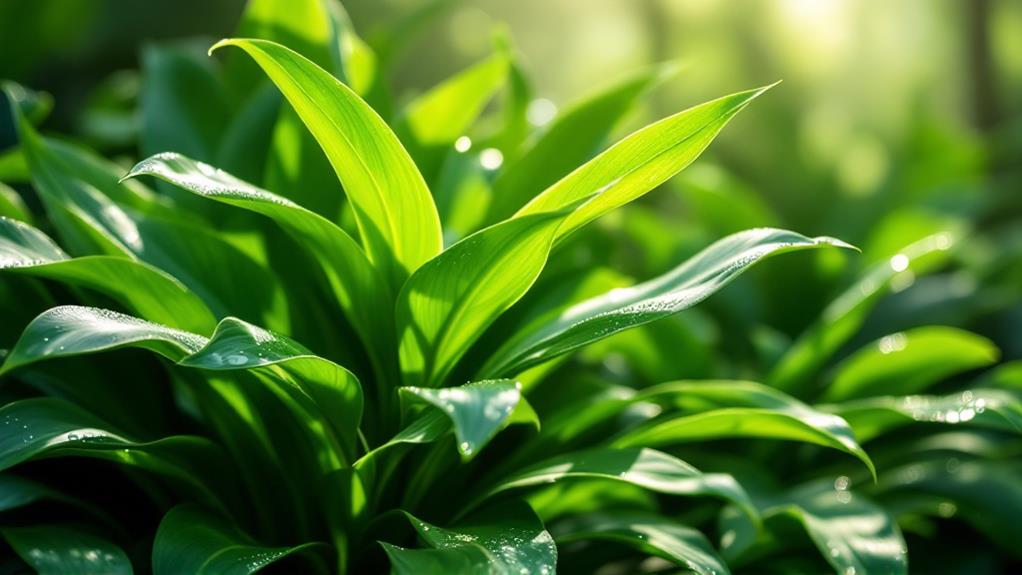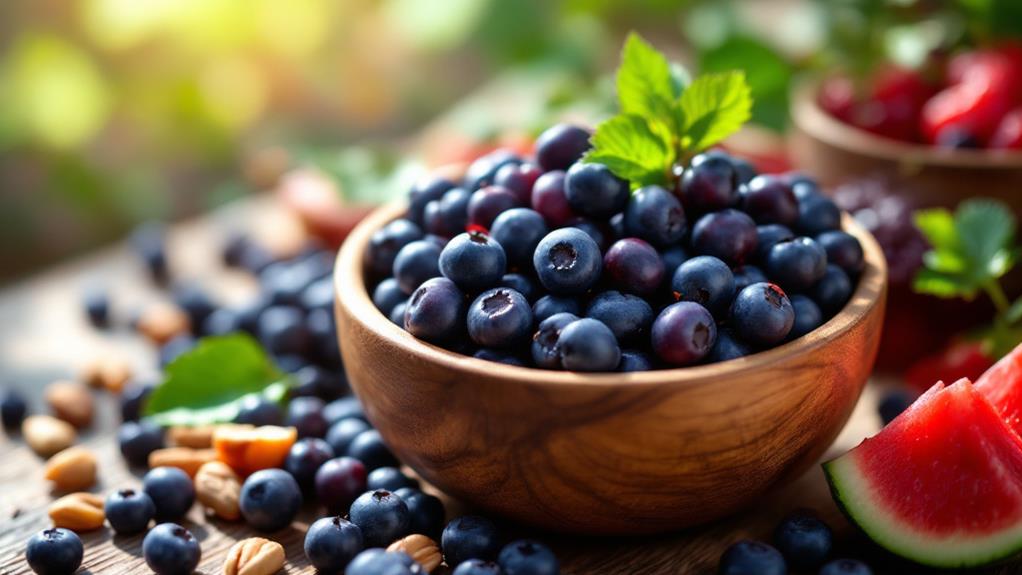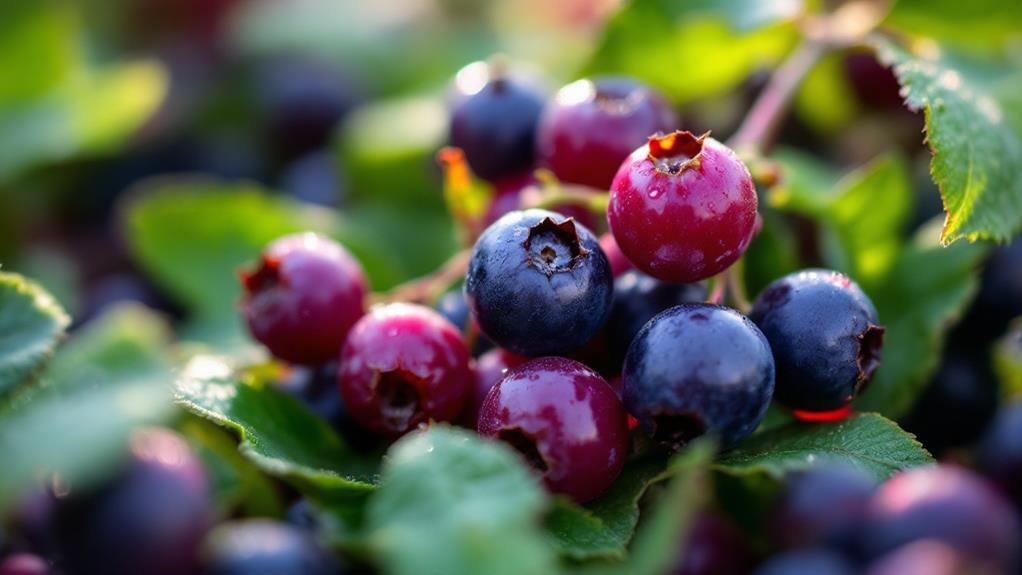Health Benefits of Pandan Leaves: A Natural Flavor and Remedy

When you investigate the health benefits of pandan leaves, you'll find a delightful blend of flavor and remedy. Packed with vitamins A and C, they bolster your immune system and improve skin health. Their antioxidants combat oxidative stress, while their anti-inflammatory properties can ease joint pain. Pandan tea supports cardiovascular wellness by reducing oxidative damage and managing cholesterol levels. Moreover, their antihyperglycemic effects help regulate blood sugar. Chewing pandan can also freshen your breath, and the calming aroma is perfect for stress relief. Uncover how embracing pandan could raise your well-being through ancient wisdom and delicious uses.
Nutritional Profile of Pandan
Pandan leaves frequently pack a nutritional punch, offering a range of benefits significant for your health. Rich in vitamins A and C, pandan supports your immune system and helps maintain healthy skin. These vitamins are fundamental, enhancing your body's defenses and contributing to a youthful appearance. When considering nutritional aspects, pandan doesn't fall short. It's loaded with notable minerals like calcium, iron, and magnesium. These minerals are critical for comprehensive wellness, ensuring strong bones, and aiding in blood health.
Including pandan in your diet won't add unwanted calories since the leaves are low in calories. This makes them a smart choice if you're watching your caloric intake but still want to enjoy flavorful meals. Another key aspect of pandan is its high antioxidant content. Antioxidants are your allies against oxidative stress, helping to reduce the risk of chronic diseases by neutralizing harmful free radicals in your body.
Moreover, pandan's dietary fiber content is notable. It plays a significant role in promoting digestive health and ensuring regular bowel movements, which is fundamental for a healthy digestive tract. Welcome pandan for its impressive nutritional profile and the myriad benefits it offers.
Culinary Uses and Recipes
The allure of pandan leaves in the culinary world is undeniable, offering a sweet, floral aroma reminiscent of vanilla and coconut that transforms ordinary dishes. In Southeast Asian cuisine, you'll find pandan leaves used to flavor rice dishes, enhancing them with a rich, fragrant taste. Try wrapping them around meats or fish before grilling or steaming; the leaves infuse the dish with a subtle, yet complex, aroma that raises the meal.
To add a tropical twist to your desserts and beverages, consider making pandan-infused syrup. Simply blend fresh leaves with water and sugar. This syrup is perfect for cocktails, desserts, and baked goods, providing a unique flavor profile. If you're into baking, pandan paste is a must. Incorporate it into sweet breads and pastries for a touch of color and a distinctive taste that pairs beautifully with coconut and other tropical delights.
For a revitalizing drink, steep pandan leaves in hot water to create pandan tea. This aromatic tea isn't just flavorful; it also carries potential health benefits. With these culinary uses, pandan leaves can easily become a staple in your kitchen, offering both flavor and versatility.
Antioxidant Benefits

Boasting a wealth of antioxidants, pandan leaves become a formidable ally in your quest for better health. These lively leaves are rich in antioxidants known for their role in combatting oxidative stress, which may help reduce the risk of chronic conditions like heart disease and cancer. One of the key components contributing to pandan's antioxidant power is polyphenols. These compounds not only lower inflammation but also protect your cells from damage caused by free radicals.
Incorporating pandan into your diet can greatly improve your cardiovascular health. Antioxidants in pandan, such as carotenoids and flavonoids, have been linked to enhanced heart health by reducing oxidative damage to blood vessels. A notable study revealed that pandan leaf extract's antioxidant activity may aid in reducing atherosclerosis, thereby supporting comprehensive heart health.
Drinking pandan tea regularly can be an excellent way to elevate your body's natural defense mechanisms against free radicals. This simple habit can promote better general health and fortify your heart against potential threats. By embracing the antioxidant benefits of pandan leaves, you're taking a proactive step towards maintaining a healthier lifestyle and reducing the risks associated with heart disease.
Joint Pain Relief
With regard to joint pain relief, pandan leaves offer a natural solution thanks to their anti-inflammatory properties. If you're dealing with arthritis or general joint discomfort, pandan leaves might be just what you need. Their anti-inflammatory properties can help alleviate pain and swelling, making them a popular choice in traditional remedies. One common method involves infusing coconut oil with pandan leaves, providing a soothing effect that eases joint pain.
Research indicates that the phytochemicals in pandan contribute greatly to reducing inflammation and improving joint function. This makes them an excellent supplement to your natural health arsenal. When you consume pandan leaf tea regularly, you may notice an improvement in recovery from joint pain, especially after exercise. This is because pandan's antioxidants combat oxidative stress, which is often linked to inflammatory conditions affecting joint health.
Blood Sugar Management

For those looking to manage blood sugar levels naturally, pandan leaves might be a valuable supplement to your diet. Preliminary studies suggest that pandan leaf extract possesses antihyperglycemic effects, which could help regulate blood sugar levels after meals. This is particularly useful for those focused on diabetes management. By consuming pandan tea, you may experience improved postprandial blood sugar control. This means after you eat, your blood sugar might not spike as much, making it easier to maintain stable levels throughout the day.
The secret behind pandan's potential benefits lies in its unique compounds. Glycosides and flavonoids found in these leaves are believed to support glucose metabolism. This could help your body process sugar more efficiently, reducing the likelihood of sudden spikes and crashes. Traditional uses of pandan include its role in diabetes management, with anecdotal evidence suggesting it can effectively reduce blood sugar spikes.
Incorporating pandan into your meals could be a natural way to improve your dietary strategies for blood sugar control. Especially in Southeast Asian diets, pandan offers a flavorful, aromatic option that complements your efforts to maintain healthy blood sugar levels.
Oral Health Benefits
Pandan leaves offer more than just blood sugar management benefits; they also contribute considerably to oral health. Thanks to their antimicrobial properties, fresh pandan leaves can help freshen your breath by combating bacteria in the mouth. This natural approach reduces the presence of harmful bacteria, which often leads to bad breath and other oral health issues. The antioxidants present in pandan leaves play a significant role as well. They help reduce oxidative stress in your mouth, supporting overall oral health and potentially reducing the risk of dental problems.
If you've ever experienced oral discomfort or irritation, chewing pandan leaves might provide relief. Traditionally, this practice has been suggested to alleviate such issues, thanks to the leaves' natural anti-inflammatory characteristics. These properties can also assist in treating bleeding gums, promoting healthier gums over time.
Incorporating pandan extracts into your regular oral care routine can offer extra support for your gums. By doing so, you may reduce the risk of dental issues and improve your gum health. So, don't hesitate to investigate the benefits of pandan leaves for a natural uplift to your oral wellbeing.
Cardiovascular Support

While many may overlook pandan leaves as just a culinary ingredient, their potential for cardiovascular support shouldn't be underestimated. They're rich in polyphenols, which might reduce heart disease risks by combating oxidative stress and inflammation in your cardiovascular system. These antioxidants play a vital role in maintaining heart health, helping to lower cholesterol levels. By reducing these levels, pandan leaves support comprehensive heart function and decrease the chances of developing atherosclerosis, a condition where arteries become narrowed and hardened.
Furthermore, pandan leaves contain carotenoids that may improve your blood circulation. Good circulation is fundamental for a healthy cardiovascular system, ensuring that oxygen and nutrients efficiently reach all your body's cells. Drinking pandan leaf tea could also help manage your blood pressure levels, offering another layer of cardiovascular support.
The leaves' anti-inflammatory properties might alleviate symptoms related to heart disease, promoting better vascular function. This means your heart and blood vessels can work more efficiently, enhancing your complete well-being. By incorporating pandan leaves into your diet, you're not only adding a unique flavor but also potentially bolstering your heart health with nature's own remedies.
Stress and Anxiety Reduction
In the hustle of everyday life, finding natural ways to reduce stress and anxiety can be invaluable. Pandan leaves offer a promising solution with their calming properties. Drinking pandan tea, for instance, has shown preliminary evidence of soothing effects on stress and anxiety, likely due to its relaxing aroma and beneficial components. The traditional use of pandan in herbal remedies highlights its role in easing anxiety and stress symptoms naturally.
Pandan leaves are rich in phytochemicals that might help modulate neurotransmitter activity. This modulation can contribute to an overall sense of well-being, allowing you to feel more at ease and less anxious. Imagine the comforting aroma of pandan enhancing your mood and promoting tranquility as part of your daily routine.
Infusions made from pandan leaves stand out as a gentle alternative to synthetic anxiolytics. They offer a natural approach to managing stress without the significant side effects often associated with conventional medications. Anecdotal evidence supports the power of pandan's aroma in creating a serene environment, making it a popular choice in aromatherapy. By incorporating pandan into your lifestyle, you can harness its stress-reducing potential for greater peace of mind.
Pandan Tea Preparation

After exploring the calming effects of pandan leaves on stress and anxiety, you might want to incorporate these benefits into your daily routine through pandan tea. To begin the preparation, chop fresh pandan leaves into small pieces. Blend these with about 2 to 3 cups of water per 10 grams of leaves to guarantee a balanced flavor. Once blended, strain the mixture to extract the liquid, creating a revitalizing pandan tea base.
You can enjoy this tea hot or chilled, and sweeten it with honey or sugar if desired to improve its natural flavor. For supplementary health benefits, consider adding ginger or lemongrass during the blending process. These ingredients not only heighten flavor but also offer extra nutritional value.
Pandan tea is more than just a flavorful beverage; it's known for its potential in blood sugar control and can be particularly beneficial when consumed after meals for digestive support. By integrating pandan tea into your routine, you're not only indulging in its delightful taste but also embracing its health benefits, making it a wise choice for both relaxation and wellness.




